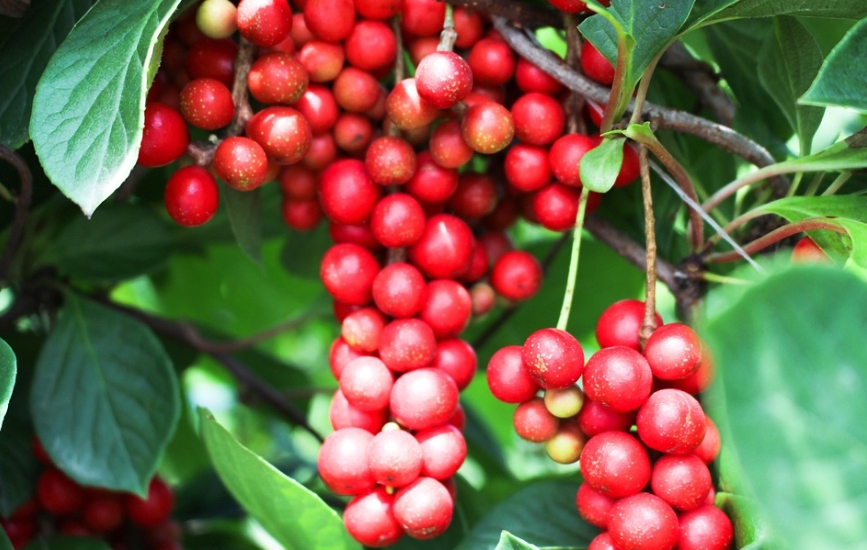Schisandra, known as Wu Wei Zi in Traditional Chinese Medicine (TCM), is a unique berry celebrated for its distinctive combination of five flavors—sweet, sour, salty, bitter, and pungent. This rare blend of tastes reflects its broad therapeutic properties and its ability to promote balance and vitality throughout the body. Native to northeastern China, Korea, and eastern Russia, schisandra has been used for centuries as a powerful adaptogen and tonic herb, supporting physical endurance, mental clarity, and organ health.

The Significance of Five Flavors in Schisandra
In TCM, flavors are not just about taste but correspond to different organ systems and therapeutic effects. Schisandra’s five flavors mean it can influence multiple organs simultaneously, particularly the Liver, Heart, Lung, Kidney, and Spleen. Each flavor contributes to its holistic benefits:
Sweet: Tonifies and nourishes, calming the spirit and replenishing energy (Qi).
Sour: Astringes and stabilizes, helping to preserve bodily fluids and prevent leakage.
Salty: Softens hardness and detoxifies, aiding liver and kidney function.
Bitter: Clears heat and dries dampness, supporting detoxification.
Pungent (Spicy): Promotes circulation and disperses stagnation, enhancing energy flow.
This complex flavor profile makes schisandra a versatile herb that harmonizes the body’s internal environment, promoting overall balance.
Traditional Uses and Historical Context
Schisandra’s medicinal use dates back to the Eastern Han Dynasty, where it was prized as a superior tonic for longevity, vitality, and mental clarity. It was traditionally used to combat fatigue, coughs, night sweats, and to improve sexual health. The berry’s ability to calm the spirit and enhance mental focus made it a valuable remedy for stress and insomnia.
In Siberia, indigenous peoples used schisandra to boost stamina, improve night vision, and reduce hunger and thirst during long hunts. This ethnobotanical use inspired Soviet scientists in the mid-20th century to study schisandra’s adaptogenic properties, confirming its ability to increase endurance, reduce fatigue, and enhance mental performance.
Health Benefits of Schisandra
Liver Protection: Schisandra helps detoxify and regenerate liver cells, improving overall liver function.
Stress Resilience: As an adaptogen, it modulates the body’s stress response, reducing fatigue and enhancing vitality.
Enhanced Physical Performance: Improves endurance and reduces feelings of exhaustion.
Mental Clarity and Mood Support: Calms the spirit, supports cognitive function, and may alleviate irritability and depression.
Respiratory Health: Traditionally used to relieve coughs and support lung function.
Immune Support: Antioxidant properties help strengthen the immune system.
Hormonal Balance: Supports sexual health and may help regulate sweating and menopausal symptoms.
Usage and Precautions
Schisandra can be consumed as dried berries, powders, extracts, or teas. Dosage varies depending on the condition and product quality, and optimal doses are not yet standardized. While generally safe, schisandra may cause allergic reactions or gastrointestinal discomfort in some individuals. It should be avoided during pregnancy and by people with certain conditions like epilepsy or gastroesophageal reflux disease.
Because schisandra can interact with medications metabolized by the liver, it is important to consult a healthcare provider before use, especially if taking prescription drugs.
FAQs about Schisandra
Here are some frequently asked questions (FAQs) about Schisandra, the five-flavor berry:
What is Schisandra?
Schisandra (Schisandra chinensis) is a berry-producing vine known as the “five-flavor fruit” because its berries contain sweet, sour, salty, bitter, and pungent tastes. It has been used in Traditional Chinese Medicine for centuries to promote balance and vitality.
What are the main health benefits of Schisandra?
Schisandra is valued for its adaptogenic properties, helping the body resist stress, boost energy, improve liver function, enhance mental clarity, support immune health, and protect against fatigue.
What are the five flavors of Schisandra and their significance?
The five flavors are sweet, sour, salty, bitter, and pungent. Each corresponds to different therapeutic effects and organ systems in TCM, allowing Schisandra to nourish the liver, kidneys, heart, lungs, and spleen simultaneously.
How is Schisandra commonly consumed?
Schisandra can be taken as dried berries, teas, powders, extracts, or tinctures. It is often brewed as a tea or used in supplements for its health benefits.
Are there any side effects or precautions?
Schisandra is generally safe when used appropriately, but may cause heartburn, upset stomach, decreased appetite, or skin reactions in some people. It is not recommended during pregnancy, breastfeeding, or for those with epilepsy, GERD, or peptic ulcers without medical advice.
Can Schisandra help with liver health?
Yes, Schisandra contains lignans that support liver detoxification, protect liver cells, and improve liver enzyme activity, making it beneficial for liver-related conditions.
Does Schisandra improve mental function?
Studies suggest Schisandra enhances cognitive clarity, reduces nervous irritability, and may help with symptoms of depression and fatigue.
Who should consider taking Schisandra?
People under stress, those seeking to improve endurance and mental focus, individuals with liver concerns, or anyone looking for a natural adaptogen may benefit from Schisandra.
Conclusion
Schisandra, the remarkable five-flavor berry, offers a wide range of health benefits by promoting balance, enhancing vitality, and supporting key organs like the liver and lungs. Its unique combination of flavors reflects its holistic ability to nourish and harmonize the body. However, despite its natural origin and long history of use, it is important to remember that Schisandra is a potent herbal medicine. To ensure safety and effectiveness, it should be used thoughtfully and under the guidance of a qualified healthcare practitioner, especially for individuals with existing health conditions or those taking other medications. Responsible use of Schisandra can help you harness its full potential for improving well-being and maintaining long-term health.
